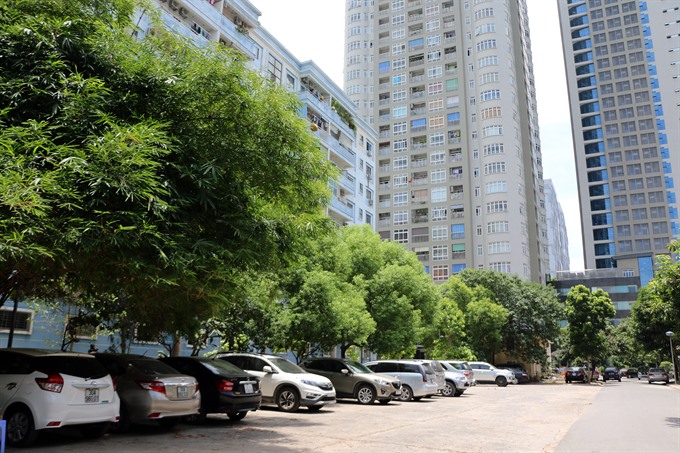 Economy
Economy

Hà Nội’s People’s Committee recently issued regulations on basement areas for parking at new construction projects in the inner city, part of the effort to tackle the severe parking space shortage.
 |
| A view of Mỹ Đình urban area in Hà Nội’s Từ Liêm District. Due to limited public land, public parking lots in the city only serve 66 per cent of total parking demand. —VNS Photo Đoàn Tùng |
HÀ NỘI – Hà Nội’s People’s Committee recently issued regulations on basement areas for parking at new construction projects in the inner city, part of the effort to tackle the severe parking space shortage.
The capital city’s statistics revealed that some 590 parking lots with total area of 38.9ha are currently in use in the downtown area, meeting only 8-10 percent of parking demand. In addition, most of the parking lots are filled beyond capacity.
Due to limited public land, public parking lots in the city only serve 66 per cent of total parking demand, precipitating the need for new construction to have parking in basements. The regulation provides specific guidance on the size of the basements for parking. It applies to construction that will take place within the area from Ring Road 2 to the city centre, within the area from Ring Road 2 to Ring Road 4, as well as in satellite and eco-urban areas.
Accordingly, every 100sq.m. of construction area in complex projects must have minimim parking area from 23 to 34sq.m.
As per the regulation, all types of housing, administrative construction and urban service construction, such as office buildings, hotels, trade centres and hospitals, as well as schools, sports and recreation centres, will have to provide basements for parking. Meanwhile, some projects will not be allowed to provide car parking, including centres for the elderly and people with disabilities, hospitals, boarding school dorms and schools from nursery and kindergarten to high school and vocational school.
The basements should be not more than five levels, and the area should be equal to the construction area at the minimum and should not cross the construction boundary.
For projects built before the regulation comes into effect, the capital city asked relevant agencies to check and propose solutions to develop appropriate parking spaces to meet demand.
This is not the first time requirements about building basements have been raised.
In April last year, the city’s Department of Architecture and Planning issued an announcement requesting all high-rise buildings have at least three levels of basements. It was then withdrawn after an objection from the National Real Estate Association, which argued that such a requirement was contrary to pre-existing construction regulations.
The regulation also required construction investors to repeat various administrative procedures, increasing costs and time, according to the association. - VNS




